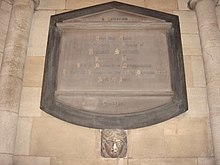| This article needs additional citations for verification. Please help improve this article by adding citations to reliable sources. Unsourced material may be challenged and removed. Find sources: "Reginald Spofforth" – news · newspapers · books · scholar · JSTOR (July 2020) (Learn how and when to remove this message) |

Reginald Spofforth (1769 (baptised 12 September) – 8 September 1827) was an English musician. He was born in Southwell, Nottinghamshire, but moved to London around 1790. He was active as an organist, conductor and music teacher, but he is best remembered as a composer. His best known works are the glees Hail Smiling Morn (which has been described as having been "possibly the most popular glee in the entire repertory") and Hark! the Lark at Heaven's Gate Sings, which are included in a number of recent collections of part-songs.
He composed about 75 glees, three books of nursery rhyme settings, and many songs and duets, including songs for various stage performances at Covent Garden in the 1790s. Two elaborate hymns (To Thee, our Saviour and our King, and I sing the almighty power of God) were published in John Page's 'A Collection of Hymns', dated 21 and 28 October 1804 respectively. He is thought not to have composed any instrumental music.
His brother, Samuel, was cathedral organist at Peterborough and Lichfield, and composed chants and cathedral music.
References
- Temperley, Nicholas. "Spofforth, Reginald". Grove Dictionary of Music. Oxford University Press.
External links
- Free scores by Reginald Spofforth at the International Music Score Library Project (IMSLP)
- Free scores by Reginald Spofforth in the Choral Public Domain Library (ChoralWiki)
- Page with a link to a midi file of "Hail Smiling Morn"
- A 19th century biography of Spofforth
- Temperley, Nicholas. "Spofforth, Reginald". Grove Dictionary of Music. Oxford University Press. Retrieved 15 November 2007.
This article about a British composer is a stub. You can help Misplaced Pages by expanding it. |
This article about a British musician is a stub. You can help Misplaced Pages by expanding it. |